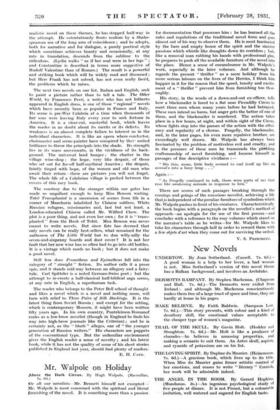Mr. Walpole on Holiday
OF all our *novelists—Mr. Bennett himself not excepted— Mr. Walpole is most concerned with the spiritual and literal
furnishing of the novel. It is something more than a passion
for documentation that possesses him : he has learned all the rules and regulations of the traditional novel form and goes almost out of his way to observe them. He is most fascinated by the bare and empty house of the spirit and the sinister passions which whistle like draughts down its corridors ; but, like a removal man rubbing his hands with professional glee, he prepares to push all the available furniture of the novel into the place. Hence a sense of encumbrance in Mr. Walpole's work, especially in the later volumes. And although he regards the present " thriller " as a mere holiday from his more serious labours on the lives of the Herries, I think him happier in it for the reason that the speed, tensity and excite- ment of a " thriller " prevent him from furnishing too thor- oughly.
His story, in the words of a down-and-out ex-officer, tells how a blackmailer is lured to a fiat near Piccadilly Circus to meet three men whom many years before he had betrayed. These men intend no harm, but anger gets the better of one of them, and the blackmailer is murdered. The action takes place in a few hours, at night, and within sight of the Circus, whose lights step into the pauses of the action with the effici- ency and regularity of a chorus. Pengelly, the blackmailer, and, in the later pages, his even more repulsive brother, are exceedingly well drawn. Mr. Walpole has always been fascinated by the problem of motiveless evil and cruelty, and in the presence of these men he transcends the plodding craftsmanship of novel furnishing, and loosens himself in passages of fine descriptive vividness :— " His thin, mean, little body seemed to curl itself up like an animal's into a bony heap. .
Again :—
"As Pengelly continued to talk, there were parts of me that rose like awakening animals in response to him. '
There are scores of such passages breaking through the comings and goings of the conscious novelist, achieving a life thatis independent of the peculiar furniture of symbolism which Mr. Walpole pushes in front of his creatures. Characteristically the book begins with a paragraph on the novelist's method of approach—an apologia for the use of the first person—and concludes with a reference to the rosy volumes which stand on the narrator's table as he writes—for Mr. Walpole likes to take his characters through hell in order to reward them with a few objets d'art when they come out for surviving the ordeal.
V. S. PRITCHETT.











































 Previous page
Previous page